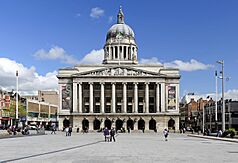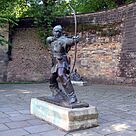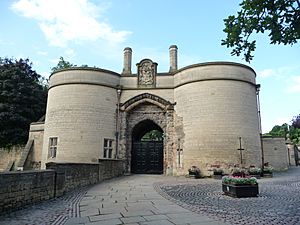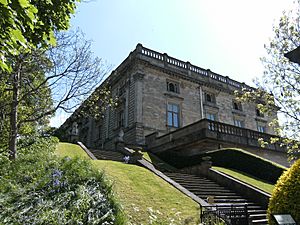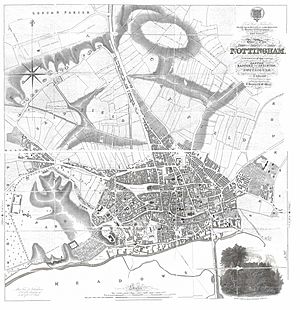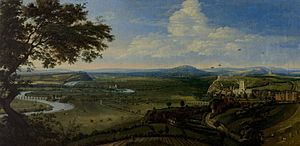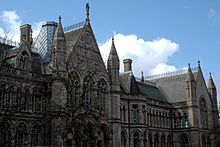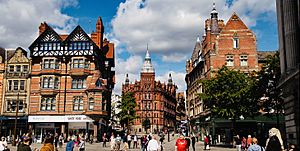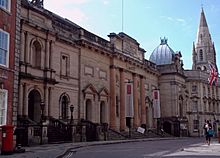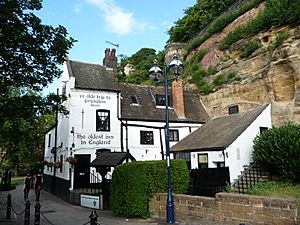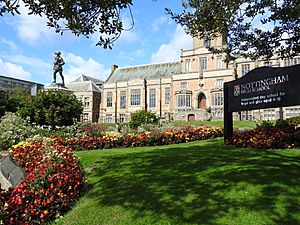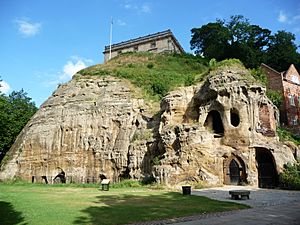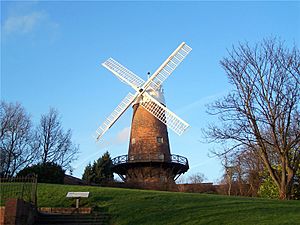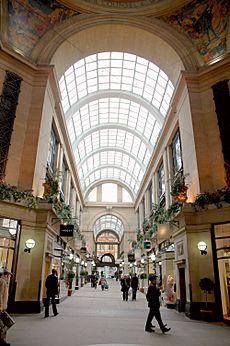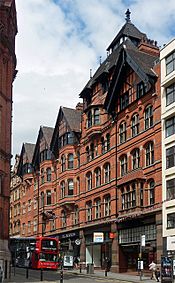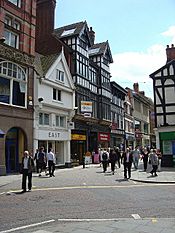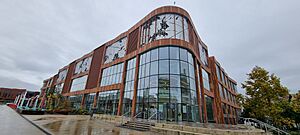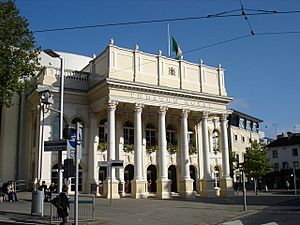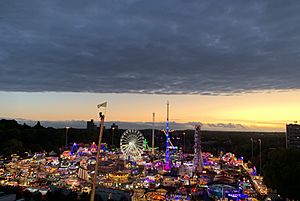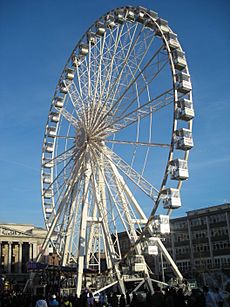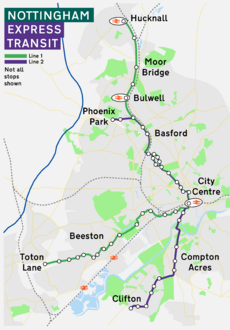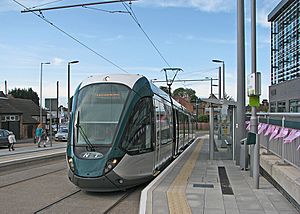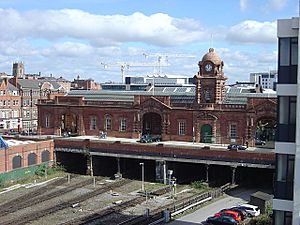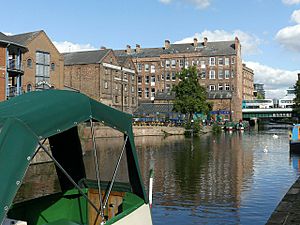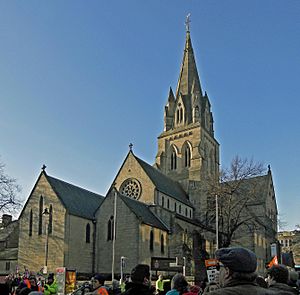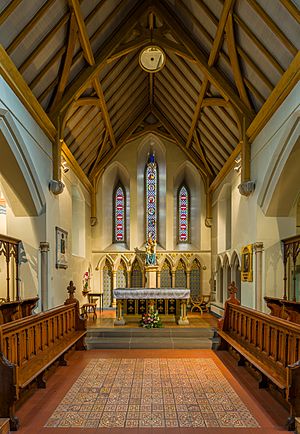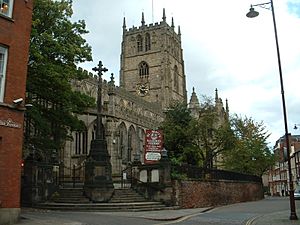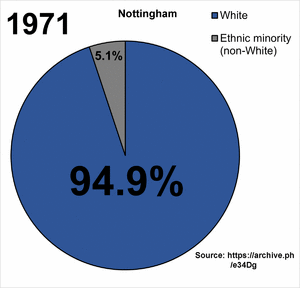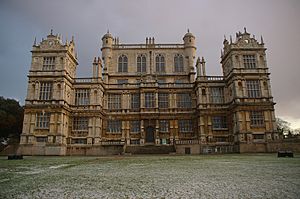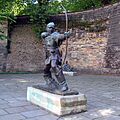Nottingham facts for kids
Quick facts for kids
Nottingham
|
||
|---|---|---|
|
City and unitary authority
|
||
|
||
|
||
| Nickname(s):
"the Queen of the Midlands"
|
||
| Motto(s): | ||
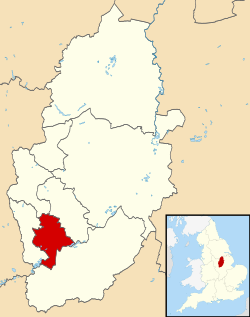
Shown within Nottinghamshire
|
||
| Sovereign state | United Kingdom | |
| Country | England | |
| Region | East Midlands | |
| Ceremonial county | Nottinghamshire | |
| Settled | 6th century | |
| City status | 1897 | |
| Unitary authority | 1998 | |
| Administrative HQ | Loxley House | |
| Civic suite | Nottingham Council House | |
| Areas of the city (2011 census BUASD) |
List
Aspley
Bakersfield Basford Bestwood Bilborough Broxtowe Bulwell (Town) Carrington Cinderhill City Centre Clifton (Village) Forest Fields Highbury Vale Hyson Green Lace Market Lenton Mapperley New Basford Radford Rise Park Sherwood Sneinton St Ann's Top Valley Wilford Wollaton |
|
| Government | ||
| • Type | Unitary authority with leader and cabinet | |
| • Body | Nottingham City Council | |
| Area | ||
| • Total | 28.81 sq mi (74.61 km2) | |
| Area rank | 249th | |
| Population
(2005 est.)
|
||
| • Total | 332,900 | |
| • Rank | 26th | |
| Demonym(s) | Nottinghamian | |
| Ethnicity (2021) | ||
| • Ethnic groups |
List
|
|
| Religion (2021) | ||
| • Religion |
List
41.2% no religion
34.7% Christianity 12.2% Islam 1.7% Hinduism 1.3% Sikhism 0.5% Buddhism 0.3% Judaism 0.7% other 7.4% not stated |
|
| Time zone | UTC+0 (GMT) | |
| • Summer (DST) | UTC+1 (BST) | |
| Postcode area |
NG
|
|
| Dialling code | 0115 | |
| ISO 3166 code | GB-NGM | |
| GSS code | E06000018 | |
| ITL code | TLF14 | |
| GVA | 2021 estimate | |
| • Total | £10.8 billion | |
| • Per capita | £33,661 | |
| GDP (nominal) | 2021 estimate | |
| • Total | £11.8 billion | |
| • Per capita | £36,980 | |
Nottingham (![]() i/ˈnɒtɪŋəm/ not-ING-əm) is a cool city in the East Midlands of England. It's famous for being the home of the legendary Robin Hood! The city is about 33 miles (53 km) south-east of Sheffield and 45 miles (72 km) north-east of Birmingham.
i/ˈnɒtɪŋəm/ not-ING-əm) is a cool city in the East Midlands of England. It's famous for being the home of the legendary Robin Hood! The city is about 33 miles (53 km) south-east of Sheffield and 45 miles (72 km) north-east of Birmingham.
Nottingham became an official city in 1897, during Queen Victoria's Diamond Jubilee. In 2021, about 323,632 people lived here. If you include the nearby towns, the population is much larger, around 768,638 people. This makes it the biggest urban area in the East Midlands.
The city is a major sports hub and was even called the 'Home of English Sport' in 2015. You'll find the National Ice Centre and the Trent Bridge cricket ground here. Nottingham is also home to two professional football teams: Notts County, the world's oldest professional league club, and Nottingham Forest, who famously won the UEFA European Cup twice!
Nottingham has a great transport system, including a railway station and the Nottingham Express Transit tram system. In 2015, UNESCO named Nottingham a 'City of Literature'. This is because of its rich history with famous writers like Lord Byron and D. H. Lawrence. The city also has three universities, making it a big centre for learning in the East Midlands.
Contents
- What's in a Name? The Story of Nottingham's Name
- Nottingham's Past: A Journey Through Time
- Nottingham's Location and Environment
- Exploring Nottingham City Centre
- Learning in Nottingham: Schools and Universities
- Nottingham's Economy: Business and Innovation
- Nottingham's Culture: Arts, Music, and Events
- Sports in Nottingham: A Sporting City
- Getting Around Nottingham: Transport Links
- Public Services: Keeping Nottingham Safe and Healthy
- Religion in Nottingham: Places of Worship
- Nottingham's People: Demographics
- Media in Nottingham: News and Entertainment
- Global Connections: Nottingham's Twin Cities
- Images for kids
- See also
What's in a Name? The Story of Nottingham's Name
The area where Nottingham stands today had people living there even before the Anglo-Saxon settlement of Britain. Back in the 9th century, it was called Tigguo Cobauc, which means 'Place of Caves' in an old British language. This name is still used in Welsh today as Y Tŷ Ogofog.
The English name 'Nottingham' comes from the Anglo-Saxons. It's believed to come from Snotingaham, which meant 'the homestead of Snot's people'. Snot was likely an Anglo-Saxon leader. Some people think it means 'homestead of caves', but the first idea is more likely for the English name.
Nottingham's Past: A Journey Through Time
Nottingham has a long and exciting history! A castle was built here in 1068 by William the Conqueror. It was placed on a sandstone hill next to the River Leen.
Before the Normans arrived, there was an Anglo-Saxon settlement in the area now called the Lace Market. It had a ditch and a wall for protection. After the Normans took over England, a new French town grew around the castle. Over time, these two towns grew together, and the Old Market Square became the city's main centre.
Nottingham Castle and Robin Hood
In 1194, when King Richard the Lionheart returned from the Crusades, his brother Prince John's supporters had taken over Nottingham Castle. King Richard besieged the castle and captured it after a tough fight.
In the famous legends of Robin Hood, Nottingham Castle is where the Sheriff of Nottingham and Robin Hood have their final battle.
Growing Through the Centuries
By the 1400s, Nottingham was known for making religious sculptures from Nottingham alabaster. These sculptures were even sent to places as far away as Iceland! In 1449, Nottingham gained the right to govern itself, which was a big deal.
During the Industrial Revolution, Nottingham became very rich because of its textile industry, especially for making lace. In 1831, people protested against the Duke of Newcastle, who was against a new law, and they even set fire to his home at Nottingham Castle.
After the Second World War, the textile industry in Nottingham slowly declined. But many of the old factory buildings in the Lace Market area have been beautifully restored and are now used for new things like apartments and shops.
Nottingham has grown quite a bit over the years. It became a 'city' in 1897 during Queen Victoria's Diamond Jubilee. The city expanded its borders several times, adding new areas like Bilborough and Wollaton.
Modern Nottingham: Sports and Growth
Electric trams were first used in Nottingham in 1901 but stopped in 1936. They were brought back in 2004, 68 years later!
Nottingham is home to Notts County, the world's oldest professional football club, started in 1862. The city's other football team, Nottingham Forest, had amazing success in the late 1970s and early 1980s under manager Brian Clough, winning the European Cup twice!
The city has continued to grow, with new homes and urban areas developing.
Nottingham's Location and Environment
Nottingham is built on low hills near the River Trent. It's surrounded by the famous Sherwood Forest to the north.
You might spot some cool wildlife in the city, like red foxes, peregrine falcons, and common kingfishers. Important nature spots nearby include Attenborough Nature Reserve and Sherwood Forest National Nature Reserve.
Areas within the City
- Alexandra Park
- The Arboretum
- Aspley
- Bakersfield
- Basford
- Beechdale
- Bestwood
- Bestwood Park
- Bilborough
- Broxtowe
- Bulwell town
- Bulwell Hall
- Carrington
- Cinderhill
- Clifton
- Dunkirk
- Forest Fields
- Highbury Vale
- Hockley
- Hyson Green
- Lace Market
- Lenton
- Lenton Abbey
- Mapperley
- Mapperley Park
- The Meadows
- New Basford
- Nottingham city centre
- Old Basford
- The Park
- Radford
- Rise Park
- Sherwood
- Sherwood Rise
- Silverdale
- Snape Wood
- Sneinton
- St Anns
- Strelley
- Thorneywood
- Top Valley
- Whitemoor
- Wilford
- Wollaton
Surrounding Areas
 |
Sheffield, Ripley, Heanor, Chesterfield, Matlock | Arnold, Hucknall, Mansfield | Gedling, Newark-on-Trent, Southwell, Lincoln |  |
| University of Nottingham, Beeston, Stapleford, Ilkeston, Wollaton, Derby, Stoke-on-Trent | Carlton, Bingham, Grantham | |||
| Long Eaton, East Midlands Airport, Tamworth, Birmingham | West Bridgford, Clifton, Ruddington, Edwalton, Loughborough, Leicester, | Melton Mowbray, Oakham |
- Arnold
- Attenborough
- Beeston
- Bestwood Village
- Bingham
- Bramcote
- Bulcote
- Burton Joyce
- Calverton
- Carlton
- Chilwell
- Colwick
- Cotgrave
- Daybrook
- Eastwood
- East Leake
- Edwalton
- Gamston
- Gedling
- Giltbrook
- Holme Pierrepont
- Hucknall
- Ilkeston (Derbyshire)
- Keyworth
- Killisick
- Kimberley
- Lady Bay
- Langley Mill (Derbyshire)
- Lambley
- Long Eaton (Derbyshire)
- Lowdham
- Netherfield
- Nuthall
- Radcliffe-on-Trent
- Redhill
- Ruddington
- Sandiacre (Derbyshire)
- Sawley (Derbyshire)
- Stapleford
- Strelley Village
- Toton
- Trowell
- Warren Hill
- West Bridgford
- Woodthorpe
Nottingham's Weather: What's the Climate Like?
Nottingham has a mild oceanic climate, like most of the UK. This means it has warm, gentle summers and mild to cool winters. It rains quite a bit throughout the year.
The highest temperature ever recorded in Nottingham was 39.8°C (103.6°F) on 19 July 2022. The lowest was -13.3°C (8.1°F) in January 1963 and January 1987.
| Month | Jan | Feb | Mar | Apr | May | Jun | Jul | Aug | Sep | Oct | Nov | Dec | Year |
|---|---|---|---|---|---|---|---|---|---|---|---|---|---|
| Record high °C (°F) | 14.5 (58.1) |
18.6 (65.5) |
22.8 (73.0) |
25.9 (78.6) |
27.6 (81.7) |
31.2 (88.2) |
36.1 (97.0) |
34.6 (94.3) |
29.6 (85.3) |
28.4 (83.1) |
17.9 (64.2) |
15.0 (59.0) |
36.1 (97.0) |
| Mean daily maximum °C (°F) | 6.9 (44.4) |
7.7 (45.9) |
10.1 (50.2) |
13.2 (55.8) |
16.4 (61.5) |
19.2 (66.6) |
21.5 (70.7) |
21.1 (70.0) |
18.1 (64.6) |
13.9 (57.0) |
9.8 (49.6) |
7.2 (45.0) |
13.8 (56.8) |
| Daily mean °C (°F) | 4.3 (39.7) |
4.7 (40.5) |
6.5 (43.7) |
9.0 (48.2) |
11.9 (53.4) |
14.8 (58.6) |
16.9 (62.4) |
16.7 (62.1) |
14.2 (57.6) |
10.7 (51.3) |
7.0 (44.6) |
4.6 (40.3) |
10.1 (50.2) |
| Mean daily minimum °C (°F) | 1.7 (35.1) |
1.7 (35.1) |
3.0 (37.4) |
4.8 (40.6) |
7.5 (45.5) |
10.4 (50.7) |
12.4 (54.3) |
12.3 (54.1) |
10.2 (50.4) |
7.4 (45.3) |
4.2 (39.6) |
2.0 (35.6) |
6.5 (43.7) |
| Record low °C (°F) | −13.3 (8.1) |
−11.1 (12.0) |
−10.6 (12.9) |
−4.6 (23.7) |
−2.1 (28.2) |
1.0 (33.8) |
4.4 (39.9) |
4.5 (40.1) |
0.9 (33.6) |
−3.1 (26.4) |
−9.2 (15.4) |
−12.0 (10.4) |
−13.3 (8.1) |
| Average precipitation mm (inches) | 59.1 (2.33) |
49.8 (1.96) |
45.5 (1.79) |
47.6 (1.87) |
49.8 (1.96) |
66.7 (2.63) |
65.2 (2.57) |
63.7 (2.51) |
57.4 (2.26) |
71.7 (2.82) |
69.5 (2.74) |
69.6 (2.74) |
715.6 (28.17) |
| Average snowfall mm (inches) | 10 (0.4) |
19 (0.7) |
5 (0.2) |
1 (0.0) |
0 (0) |
0 (0) |
0 (0) |
0 (0) |
0 (0) |
0 (0) |
2 (0.1) |
5 (0.2) |
42 (1.6) |
| Average precipitation days (≥ 1.0 mm) | 11.6 | 10.9 | 10.1 | 9.4 | 9.0 | 9.8 | 9.4 | 9.5 | 9.8 | 11.2 | 12.7 | 12.3 | 125.9 |
| Average snowy days | 2.7 | 3.8 | 1.3 | 0.2 | 0.0 | 0.0 | 0.0 | 0.0 | 0.0 | 0.0 | 0.3 | 1.5 | 9.8 |
| Average relative humidity (%) | 89 | 86 | 82 | 81 | 81 | 83 | 79 | 78 | 81 | 85 | 88 | 90 | 84 |
| Average dew point °C (°F) | 2 (36) |
2 (36) |
2 (36) |
5 (41) |
7 (45) |
10 (50) |
12 (54) |
12 (54) |
11 (52) |
9 (48) |
5 (41) |
3 (37) |
7 (44) |
| Mean monthly sunshine hours | 56.0 | 77.7 | 116.2 | 152.3 | 191.5 | 170.5 | 191.5 | 177.6 | 137.5 | 96.9 | 64.1 | 55.3 | 1,487 |
| Mean daily daylight hours | 8.2 | 9.9 | 11.9 | 14.0 | 15.9 | 16.8 | 16.3 | 14.7 | 12.7 | 10.6 | 8.7 | 7.7 | 12.3 |
| Average ultraviolet index | 2 | 2 | 3 | 3 | 4 | 4 | 4 | 4 | 4 | 3 | 2 | 2 | 3 |
| Source 1: Met Office European Climate Assessment and Dataset | |||||||||||||
| Source 2: WeatherAtlas Time and Date (dew point 2005–2015) | |||||||||||||
| Month | Jan | Feb | Mar | Apr | May | Jun | Jul | Aug | Sep | Oct | Nov | Dec | Year |
|---|---|---|---|---|---|---|---|---|---|---|---|---|---|
| Mean daily maximum °C (°F) | 7.5 (45.5) |
8.1 (46.6) |
10.5 (50.9) |
13.6 (56.5) |
16.7 (62.1) |
19.6 (67.3) |
22.0 (71.6) |
21.8 (71.2) |
18.7 (65.7) |
14.5 (58.1) |
10.4 (50.7) |
7.8 (46.0) |
14.3 (57.7) |
| Daily mean °C (°F) | 4.7 (40.5) |
5.0 (41.0) |
6.8 (44.2) |
9.1 (48.4) |
11.9 (53.4) |
14.9 (58.8) |
17.1 (62.8) |
17.0 (62.6) |
14.4 (57.9) |
11.0 (51.8) |
7.4 (45.3) |
4.9 (40.8) |
10.3 (50.5) |
| Mean daily minimum °C (°F) | 1.9 (35.4) |
1.9 (35.4) |
3.0 (37.4) |
4.6 (40.3) |
7.2 (45.0) |
10.1 (50.2) |
12.1 (53.8) |
12.2 (54.0) |
10.1 (50.2) |
7.5 (45.5) |
4.4 (39.9) |
2.1 (35.8) |
6.5 (43.7) |
| Average precipitation mm (inches) | 50.7 (2.00) |
41.2 (1.62) |
40.6 (1.60) |
44.3 (1.74) |
46.3 (1.82) |
63.7 (2.51) |
61.8 (2.43) |
54.6 (2.15) |
49.2 (1.94) |
62.7 (2.47) |
56.9 (2.24) |
58.1 (2.29) |
630.0 (24.80) |
| Average precipitation days (≥ 1.0 mm) | 10.9 | 9.6 | 9.6 | 9.6 | 8.9 | 9.5 | 9.6 | 8.6 | 8.9 | 10.4 | 11.0 | 11.7 | 118.3 |
| Mean monthly sunshine hours | 51.6 | 76.1 | 115.6 | 152.0 | 182.9 | 161.8 | 190.1 | 175.6 | 136.7 | 100.8 | 61.5 | 47.7 | 1,452.4 |
| Source: Met Office | |||||||||||||
Exploring Nottingham City Centre
The heart of Nottingham is the Old Market Square. The impressive Council House stands here, built in the 1920s. It has grand columns and two stone lion statues guarding the square. Inside, the Exchange Arcade is a shopping centre.
You'll find tall office buildings along Maid Marian Way. The area around Oxford and Regent Streets has many small businesses. The Albert Hall is opposite the beautiful St Barnabas' Roman Catholic Cathedral.
Nottingham Castle is located south-west of the centre. The central part of the city has Nottingham Trent University's Gothic-style Arkwright Building. The Theatre Royal on Theatre Square, built in 1865, is also very grand. King and Queen Streets show off amazing Victorian architecture.
The Canal-side area, south of the city, is near Nottingham railway station. Many old industrial buildings there have been turned into cool bars and restaurants.
The eastern part of the city includes Hockley Village, known for its unique shops. The Victoria Centre shopping mall is also here, built on the site of the old Nottingham Victoria railway station. Only the old station hotel and clock tower remain. The tall Victoria Centre flats are the highest buildings in the city.
The Lace Market: A Historic Quarter
The Lace Market area, just south of Hockley, has streets lined with old red brick warehouses. Many of these buildings have been changed into apartments, bars, and restaurants.
The biggest building in the Lace Market is the Adams Building, which is now used by Nottingham College. The old Shire Hall, once Nottingham's main court and prison, is now home to the National Justice Museum.
Nottingham's Oldest Pubs: A Trip Through Time
Ye Olde Trip To Jerusalem (the Trip) is partly built into the cave system under Nottingham Castle. It's thought to be one of England's oldest pubs, possibly from 1189!
The Bell Inn and Ye Olde Salutation Inn also claim to be very old. The Trip's current building is from the 17th or 18th century, but the caves are much older. They might have been used to store beer for the castle long ago. The Bell Inn's building is likely the oldest of the three, and its medieval cellars are still used for beer.
Learning in Nottingham: Schools and Universities
Nottingham is a big centre for education. Almost 62,000 students attend the city's three universities: Nottingham Trent University, the University of Law, and the University of Nottingham. The University of Nottingham Medical School is part of the Queen's Medical Centre hospital.
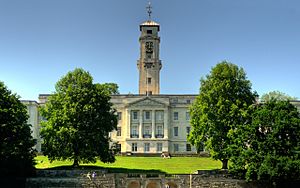
The city also has several colleges for further education, like Bilborough College and Nottingham College. The Confetti Institute of Creative Technologies focuses on media studies.
Nottingham has independent schools too. The oldest school is Nottingham High School, founded in 1513.
Museums: Discovering Nottingham's Heritage
Nottingham has many interesting museums:
- National Justice Museum – Learn about law, crime, and punishment through history. It's in the old Shire Hall.
- City of Caves – Explore a network of man-made caves carved out of sandstone beneath the city.
- Green's Mill, Sneinton and Science Centre – A working windmill that was home to the famous mathematician George Green.
- Nottingham Castle Museum – See art collections and learn about Nottingham's history. It also has the Sherwood Foresters Regimental Museum.
- Nottingham Industrial Museum – Located in Wollaton Park, it shows collections about textiles, transport, and mining.
- Nottingham Natural History Museum – Also at Wollaton Hall, with collections of animals, plants, and rocks.
Nottingham's Economy: Business and Innovation
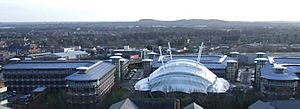
Nottingham has the biggest economy in the East Midlands. Many large companies have their main offices here, including Alliance Boots (a big pharmacy chain), Experian (a credit reference agency), and E.ON Energy UK (an energy company). Other well-known companies include Games Workshop (games and publishing) and Speedo (sportswear).
In 2005, Nottingham was named one of the UK's six science cities. BioCity is a major centre for bioscience companies, helping new science-based businesses grow. The city council wants to focus on new technologies, digital media, and financial services to help the economy.
Nottingham used to be a big centre for making bicycles. The Raleigh Bicycle Company started here in 1886.
In 2015, Nottingham was ranked in the top 10 UK cities for job growth. More new companies started in Nottingham in 2014–15 than in any other UK city!
Shopping in Nottingham: Retail Therapy
The Bridlesmith Gate area has many designer shops, including the first Paul Smith boutique. You can find unique shops in smaller streets and alleys like Poultry Walk and Hurts Yard.
Nottingham's main shopping centre is the Victoria Centre. It was built on the site of an old railway station.
Creative Quarter: Boosting Creativity
The Creative Quarter is a project by Nottingham City Council to help creative businesses grow and create jobs. It focuses on the east side of the city, including the Lace Market and Hockley. The government has invested money to support this project.
Nottingham's Culture: Arts, Music, and Events
Libraries and Art Galleries
Nottingham Central Library opened in 2023, offering books, computers, and other public services.
Art lovers can visit the Nottingham Contemporary art centre in the Lace Market, which opened in 2009. The New Art Exchange is another gallery, known for showing diverse artists.
Public Art: Statues and Sculptures
Nottingham has many public artworks. You can see traditional statues like Robin Hood and Brian Clough. Modern art includes Anish Kapoor’s Sky Mirror at Nottingham Playhouse.
Venues: Where to See a Show
Nottingham has two large theatres: the Nottingham Playhouse and the Theatre Royal. They are next to the Royal Concert Hall, forming the Royal Centre. There are also smaller theatres like the Nottingham Arts Theatre.
For movies, there's a Cineworld and a Showcase. Independent cinemas include the Arthouse Broadway Cinema and the Art Deco Savoy Cinema.
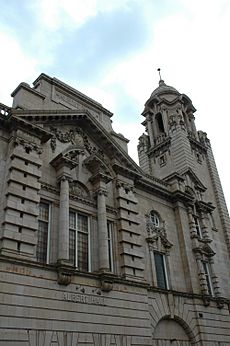
Nottingham has several big places for music and entertainment, such as the Royal Concert Hall, Rock City, and the Nottingham Arena.
Music Scene: Sounds of the City
Many bands and artists have come from Nottingham, including the 1960s band Ten Years After and more recent artists like Jake Bugg and London Grammar.
Nottingham is also home to Earache Records, a big independent record label that started in 1986. The city has a lively classical music scene and is known for its hip-hop scene.
Annual Events: Fun Throughout the Year
Wollaton Park hosts an annual music event called Splendour. Big names like Madness and Scissor Sisters have performed there.
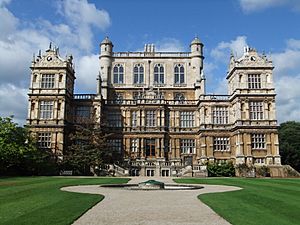
Nottingham celebrates many cultures with events like the Asian Mela, a St Patrick's Day parade, and fireworks for the Chinese New Year.
The city is famous for its annual Goose Fair, a huge funfair held every October. It started over 700 years ago as a market for geese!
Since the late 1990s, Nottinghamshire Pride has organized an annual pride parade in July.
Food and Drink: A Taste of Nottingham
Nottingham has over three hundred restaurants. Some have won awards, and there are even two Michelin-starred restaurants: Alchemilla and Restaurant Sat Bains with Rooms. Nottingham is also known as one of the UK's most vegan-friendly cities.
Tourism: Visiting Nottingham
In 2010, Nottingham was named one of the "Top 10 Cities to Visit". It was also ranked number one for the 'Best Value City Break' by TripAdvisor in 2017. Tourism brings a lot of money to the city.
Many local businesses use the fame of Robin Hood to promote themselves. The Robin Hood Pageant takes place each year. Sherwood Forest County Park, about 17 miles (27 km) north of Nottingham, is a Natural Nature Reserve. It's said that Robin Hood hid near the Major Oak, a giant tree over 1,000 years old!
Every February, Nottingham celebrates Light Night, with many free creative events that light up the city.
Sports in Nottingham: A Sporting City
Football: Home of the Oldest Club
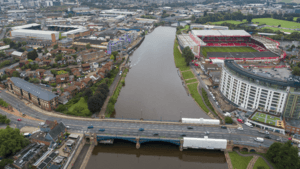
Nottingham is home to two professional football clubs: Notts County and Nottingham Forest. Their stadiums are very close to each other, on opposite sides of the River Trent.
Notts County, formed in 1862, is the oldest professional football club in the world! They play at Meadow Lane. Nottingham Forest plays at the City Ground and famously won the European Cup twice under manager Brian Clough.
Nottingham was named the 2015 City of Football, which brought funding to encourage more people to play the sport.
Other Sports: Ice, Rugby, and More
Nottinghamshire County Cricket Club plays at Trent Bridge, a famous cricket ground.
The rugby union team, Nottingham R.F.C., plays in the RFU Championship. Nottingham also has an amateur rugby league team, the Nottingham Outlaws, and an American football club, the Nottingham Caesars.
The city was the training place for Torvill and Dean, who won gold medals in ice dance at the 1984 Winter Olympics. The National Ice Centre is home to the Nottingham Panthers ice hockey team.
Other sports events include the annual Nottingham Trophy tennis tournament and the "Robin Hood" Marathon. In 2015, Nottingham was officially named the Home of Sport by VisitEngland.
Getting Around Nottingham: Transport Links
Air Travel: East Midlands Airport
Nottingham is served by East Midlands Airport, which is about 15 miles (24 km) south-west of the city centre.
Trams: Modern Rail System
Nottingham reintroduced trams in 2004, making it one of only a few English cities with a modern tram system. The network has expanded to connect the city centre with northern, southern, and western suburbs.
Trains: Nottingham Railway Station
Nottingham railway station is the main train station in the city. It's the second-busiest station in the Midlands.
Nottingham used to have several other railway stations, but most have closed. For example, Nottingham Victoria was once the second-largest station, but it's now the site of the Victoria Centre shopping mall.
Buses: Award-Winning Service
Nottingham has its own bus company, Nottingham City Transport (NCT), which is the biggest transport operator in the city. NCT has won many awards for its excellent service.
Roads: Less Car-Dependent
In 2012, Nottingham became the first UK city to introduce a workplace parking levy. This means businesses pay a fee for employee parking spaces, and the money helps fund the city's tram system. This has helped reduce traffic and increase public transport use.
In 2010, Nottingham was named 'England's least car-dependent city'.
Scooter Hire: A New Way to Travel
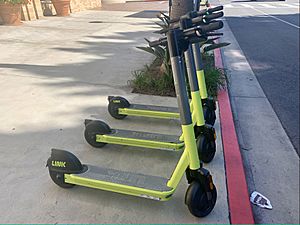
Nottingham has been part of a trial for hiring electric scooters for short journeys. Riders must be at least 18 and have a driving licence. The scooters were temporarily removed in late 2023, but the city council plans to find a new provider to continue the scheme.
Waterways: Past and Present Use
Nottingham's waterways, like the Nottingham Canal, were once very important for transporting goods. Today, they are mainly used for fun activities and leisure.
Public Services: Keeping Nottingham Safe and Healthy
Emergency Services
Nottinghamshire Fire and Rescue Service provides fire and rescue services, and East Midlands Ambulance Service handles medical emergencies. Both have their main offices in Nottingham.
The city has two main hospitals: the Queen's Medical Centre (QMC) and Nottingham City Hospital. The QMC is a teaching hospital connected to the University of Nottingham Medical School.
Nottinghamshire Police handles law enforcement. Nottingham has a Crown Court and a Magistrates' Court. The city's crime rate has fallen a lot since 2007.
Utilities: Water and Energy
Severn Trent Water supplies fresh water and treats sewage for Nottingham.
Nottingham was home to the UK's first local authority-owned energy company, Robin Hood Energy. The city also has one of the largest district heating systems in the UK, which provides heat to homes and businesses.
Religion in Nottingham: Places of Worship
Nottingham doesn't have an Anglican (Church of England) cathedral, even though it's a city. The bishop for the area is based at Southwell Minster, outside the city.
However, Nottingham has three important historic Anglican churches that date back to the Middle Ages: St. Mary the Virgin (the oldest and largest), St. Peter's (the oldest building in continuous use), and St. Nicholas'.
Nottingham is also home to the Roman Catholic Cathedral of St. Barnabas, which was designed by Augustus Pugin and opened in 1844. Today, you can find places of worship for all major religions in Nottingham, including Christianity and Islam.
Nottingham's People: Demographics
| Year | 1981 | 1991 | 2001 | 2011 | 2016 | 2021 | 2031 |
|---|---|---|---|---|---|---|---|
| Population | 263,581 | 263,526 | 266,987 | 305,680 | 325,282 | 323,632 | 354,000 |
| Source | Census | ONS | ONS | ONS Projections | |||
The population of Nottingham is about 323,632 people (as of 2021). The wider area of Greater Nottingham has about 729,977 people. The city is quite diverse: about 65.9% of people are White, 14.9% are Asian, and 10% are of West Indian origins.
Media in Nottingham: News and Entertainment
Television: Local Broadcasts
The BBC has its East Midlands headquarters in Nottingham. BBC East Midlands Today is broadcast from the city every weekday evening.
ITV Central used to have studios in Nottingham, but they are now part of the University of Nottingham. The city also has its own local TV station, Notts TV, which started broadcasting in 2014.
Radio: Tuning In
Nottingham has several local radio stations, including BBC Radio Nottingham, Gold East Midlands, and Capital Midlands.
The city's two universities also have their own student radio stations: Fly FM at Nottingham Trent University and University Radio Nottingham (URN) at the University of Nottingham.
Newspapers and Magazines
Nottingham's main local newspaper is the Nottingham Post, published daily.
LeftLion magazine is a free magazine that covers Nottingham's culture, including music, art, and theatre.
Film: Nottingham on Screen
Nottingham has been used as a filming location for many movies, both local and international. Some famous films shot here include Saturday Night and Sunday Morning (1960) and parts of the Batman film The Dark Knight Rises (2012), where Wollaton Hall was used as Wayne Manor.
Global Connections: Nottingham's Twin Cities
Nottingham is twinned with several cities around the world. This means they have special friendly relationships to promote cultural exchange and understanding.
Nottingham ended its twinning relationships with Minsk (Belarus) and Krasnodar (Russia) in March 2022.
Images for kids
See also
 In Spanish: Nottingham para niños
In Spanish: Nottingham para niños


